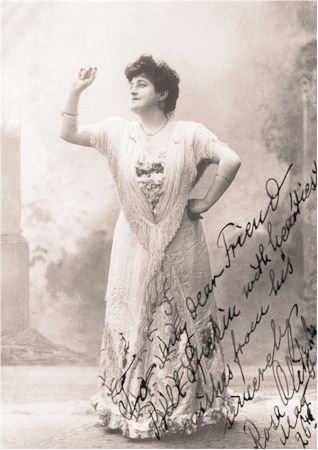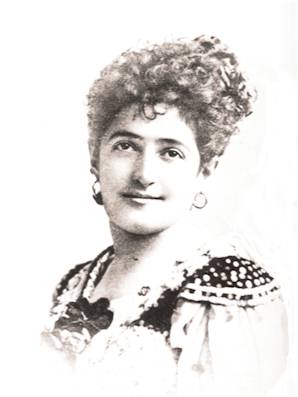German contralto, 1873 - 1949
As Carmen
(courtesy of Charles B. Mintzer) Biographical notes: Of Polish descent, Rosa Olitzka was born in Berlin and began her voice lessons there with Julius
Hey. Later in Paris she studied with Désirée Artôt de Padilla, and made her debut in a Berlin recital when she was barely sixteen. Olitzka had quickly fine-tuned a rich, velvety and steady
contralto instrument, and was at the beginning of a long operatic career that would take her just about everywhere in a large and varied repertoire.
The earliest years of her career included engagements at Brünn (Brno), Hannover, Hamburg and Dresden (1892 – 94) before Olitzka continued on to London. She sang frequently at Covent Garden until 1907, where the
Siegfried Erda was generally her most admired interpretation. Olitzka was also a success in St. Petersburg, Berlin, Milan (La Scala), Brussels and especially
Paris, where her rôles included Waltraute in a French-language production of Götterdämmerung in 1902. She toured the United States with the Damrosch troupe in 1894, and managed to crowd
in four seasons at the Metropolitan between 1895 and 1901. She eventually settled in the United States, singing in recital tours and with the Boston and Chicago Opera Companies. She retired to
Chicago and taught there till her death. Comments: Rosa Olitzka was definitely a product of her unique era, and her name appeared numerous times
on programs that featured at least six other top-notch singers in a single opera; lavish casting was possibly the finest aspect of Olitzka’s "Golden Age." At various times, and in a number of
houses, her competition for the contralto rôles included Schumann-Heink, Giulia Ravogli, Eugenia Mantelli and Sofia Scalchi, but even those Titans could not push Olitzka onto the sidelines.
Her repertoire was large and all encompassing. She was a particularly outstanding Amneris (she once remembered singing the rôle over 50 times in a single year), and was highly acclaimed in
the medium-to-large sized Wagnerian rôles such as Mary in Der Fliegende Holländer, Ortrud, Fricka in Die Walküre, Brangäne, Magdalene in Die Meistersinger and Erda. But the amiable
Olitzka, devoid of "diva" tendencies, was happy to oblige management in the smaller ensemble rôles: she sang various Norns, Valkyries and Rhinemaidens on countless occasions.
Her versatility extended to the French and Italian works as well – Carmen and Azucena were among her finer interpretations, as were Lola in Cavalleria Rusticana and Maddalena in Rigoletto.
But she was especially adept and most frequently cast in the "pants" rôles such as the Shepherd in Tannhäuser, Siebel in Faust, Urbain, Stéfano in Romeo et Juliette, Frédéric in Mignon
and even a "Boy" (or Genie) in Die Zauberflöte.
As Carmen Recordings: Rosa Olitzka left behind a sizeable recorded legacy that includes discs made for G&T,
Zonophone, Lyrophone, Columbia and even a couple of Edison cylinders. Poetic license was common in the acoustical recording era, and one of Olitzka’s best records is also one of the most
imaginative attempts at cutting/condensing music to accommodate time restrictions; she gives us a portion of the Amneris/Radames scene from Act Four of Aida, except that a tenor is nowhere
to be heard and she sings in German! Despite these incongruities, the record is very effective both vocally and as a dramatic interpretation.
Too many of Olitzka’s records were made for the technically inept American Columbia company around 1912, by which time her voice was somewhat worse for wear. Sometimes there is a
tremulous quality, labored in the lower ranges and not as secure as the voice sounds on earlier recordings. Still, there remains much to be admired, and in a varied array of music.
"O jeunes filles" from Pique Dame has her plunging in and out of octaves with an almost reckless abandon as she delivers cavernous low notes and a dazzling top, crowned by a remarkable trill.
Much the same can be said of Fidès’ "Ah, mon fils," but here the voice is sometimes unwieldy and the final note crumbles away beneath her feet. Perhaps it’s best that present day productions of Tannhäuser
generally use a boy soprano for the Shepherd; in a recording of this music, Olitzka sounds matronly and lacking in charm, but it’s easy to imagine her crossing the stage with a sheep
(or two) flung over her shoulders – and this just shouldn’t be the case when listening to Wagner’s melodic little boy. In her version of the "Brindisi" from Lucrezia Borgia
, Olitzka does not match the virtuosity of Schumann-Heink’s account, but she does come close on some of the highest reaching trills. Her "Che farò" from Orfeo
is well sung, but it is not an especially distinguished interpretation. Here the phrasing is sometimes choppy and there are occasional intonation problems. Excerpts from the contralto standards such as
Samson et Dalila, La Gioconda, Le Cid and Sapho have their moments good and bad, but are generally satisfying souvenirs. The audible evidence suggests
that, at least by the time she made most of her recordings, she was more comfortable in the mezzo-soprano range, for music requiring higher tessitura is more pleasing to the ear.
Like a great many of her contemporaries, Rosa Olitzka has yet to be adequately represented on CDs, but she is included on Symposium’s recent "The Four – Minute Cylinder, Volume 2" and on Mike Richter’s
My warmest thanks to George Parous and Charles B. Mintzer
|


